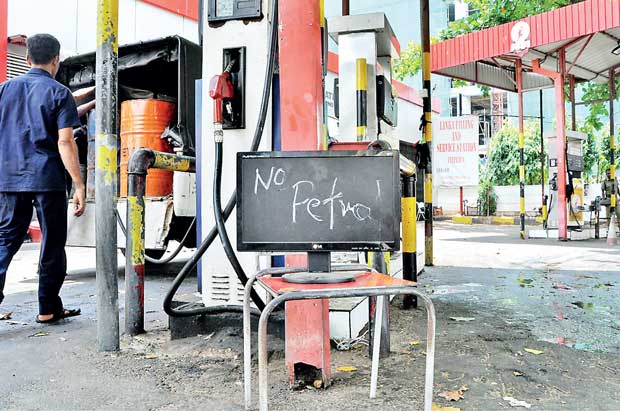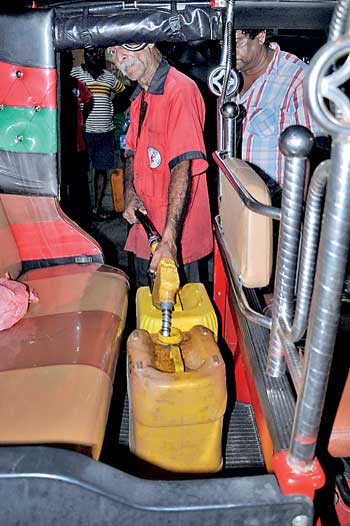Reply To:
Name - Reply Comment
Last Updated : 2024-04-19 07:40:00
 Fuel staions rub dry without petrol
Fuel staions rub dry without petrol
The “indefinite” work stoppage launched by the trade unions of the Ceylon Petroleum Corporation (CPC) on July 25 was the most absurd and foolhardy trade union action resorted to by any trade union in the recent times. The absurdity and the folly in the strike lay in its professed indefinity. One  can imagine the situation that would have prevailed in the country had the strike been indefinite, in its professed sense.
can imagine the situation that would have prevailed in the country had the strike been indefinite, in its professed sense.
The government had only three options in the light of the CPC employees’ strike. The first was meeting the demands of the strikers. Then the authorities would have had to abandon the leasing out of the Hambantota Port and the related bunkering facility to a Chinese company and some of the Tanks at the oil tank farm in Trincomalee to India. Reviving of the Sapugaskanda Oil Refinery was also another demand by the CPC unions.
The government has resorted to lease out the Humabntota Port and the bunkering facility as well as the Tricomalee tanks as a way out of the current economic mess, especially the debt burden it is faced with. In the eyes of the government leaders these are the best options left with them to resolve these issues. Therefore meeting these demands, except for the one on the Sapugaskanda refinery, is out of the question.

the strike and allow it to go on unhindered as the government had done during many trade union actions recently. However, the bearing that an indefinite strike by the petroleum workers would have had on
other sectors in the country would be totally different from what any other strike would have ha
d.That was somewhat felt by the country during the only day the CPC workers stopped distribution of oil, before their struggle was crushed by the government.
y been indefinite and allowed to continue unhindered, there would not have been trains on tracks and vehicles on roads initially and within days it would have had a chain reaction on all offices and work places. If this happened, employees would have found it difficult to report for work for want of transport facilities. Had all workplaces such as banks, harbours, shops, hospitals, factories, schools etc. come to a standstill and thereby halting the supply of food, water, electricity and medicine, that would have been the end of the government. The masses would have definitely revolted against it. Therefore no sane person should have expected any government to tolerate such a situation. Then the only option that would be left with the government was the crack down on the trade union action which was what happened.
This is no doubt a highhanded act by the government and not in anyway good governance. But this action was invited by the workers as a result of the indefinity of the strike, in spite of the question remaining whether their demands were reasonable or not. A similar situation arose 21 years ago, in 1996 when the employees of the Ceylon Electricity Board (CEB) struck work putting forward several demands to be met, during the Presidency of Chandrika Kumaratunga. Both parties to the conflict, the government and the CEB trade unions were so adamant in their stances that several rounds of talks collapsed without any tangible results.
 Even the common man was affected
Even the common man was affected
After several days of strike the then Minister of Power and Energy and Deputy Minister of Defence General Anurudda Ratwatte said that his role as the Power and Energy Minister was over and he was going to act as the Deputy Defence Minister. The Army was deployed to track down the trade union leaders and other employees who had by then gone into hiding. They were brought to their respective workplaces and forced to resume work.
Conditions hadn’t been ripe last month for an indefinite strike by the CPC employees. Such a strong strike would have crippled all other sectors of the economy and also social life. Even the government itself would have been crippled. Given its indefiniteness, it was a revolt against the government.
On the other hand the government wasn’t so unpopular for it not to crack down on such a drastic trade union struggle at this stage. If such an indefinite strike is to succeed it should be a part of a wider revolt that is aimed at capturing power. Hence the CPC strike was tantamount-as the then JVP Leader Rohana Wijeweera described the general strike of July 1980-to launching of an intercontinental ballistic missile at the beginning of a war between two countries.
 Vehicles queue up for petrol
Vehicles queue up for petrol
The time for the CPC strike was also inopportune. The petroleum workers resorted to their trade union action at a time when the people had become fed up with and sick of demonstrations that cause traffic congestion for hours almost daily and strikes, especially the life threatening work stoppages by the government doctors.
The masses irrespective of their political parties were hankering for the petroleum strike to stop even without wanting to know the demands of the strikers, as every aspect of their life had been affected with it even before it started. And they were unfortunately happy when the army took over the CPC terminal premises in Kolonnawa while thugs attacked the strikers. The flip side was the government being emboldened and encouraged to take similar suppressive measures against other trade union actions as well.
Had all workplaces such as banks, harbors, shops, hospitals, factories, schools etc. come to a standstill and thereby halting the supply of food, water, electricity and medicine, that would have been the end of the government. The masses would have definitely revolted against it
Although both main political parties, the United National Party (UNP) and the Sri Lanka Freedom Party (SLFP) had a track record of cracking down on trade unions and student movements and using thugs in those measures, the UNP, the main party taking all important decisions of the incumbent government, has the worst history in that sense. It was during its 17-year-rule that more than 40,000 workers were sacked from government and semi-government institutions for engaging in the famous 1980 July strike, demanding a mere Rs 10 increment in their daily wage. On June 5 in the same year, workers of trade unions, affiliated to various political parties, had launched a “national day of protest” demanding the same wage increase. The UNP Government deployed its goons against the demonstrators during which Trade Union Leader Somapala was beaten to death. As the saying goes “old habits die hard”, the UNP leaders used thugs this time as well to attack the strikers at the CPC terminal in Kolonnawa.
UNP parliamentarian S.M.Marikkar who has been entrusted with the Kolonnawa electorate had ridiculously told that it was the people of the area who had attacked the workers. That too was history repeating itself. When the former ministers Lalith Athulathmudali and Gamini Dissananayke were attacked by thugs during a demonstration in front of the Fort Railway Station, after they broke away from the UNP Government of President R.Premadasa, the then Prime Minister D.B.Wijetunga told parliament that it was the people inconvenienced by the demonstration who attacked the demonstrators.
Another handicap with the CPC employees’ strike was that it didn’t have the support of the general public, mainly because they didn’t know what was going on and what the workers were demanding for. The Government had very cleverly confused the country divided on party lines by comparing the deals that were made by the previous Government of President Mahinda Rajapaksa in respect of the Hambantota Port and the outright sale of lands to the foreign companies.
All in all,, the incidents at Kolonnawa were a clear indication of where the country is heading for in the future, especially with regard to trade union struggles.
Pix by Nisal Baduge

Add comment
Comments will be edited (grammar, spelling and slang) and authorized at the discretion of Daily Mirror online. The website also has the right not to publish selected comments.
Reply To:
Name - Reply Comment
On March 26, a couple arriving from Thailand was arrested with 88 live animal
According to villagers from Naula-Moragolla out of 105 families 80 can afford
Is the situation in Sri Lanka so grim that locals harbour hope that they coul
A recent post on social media revealed that three purple-faced langurs near t